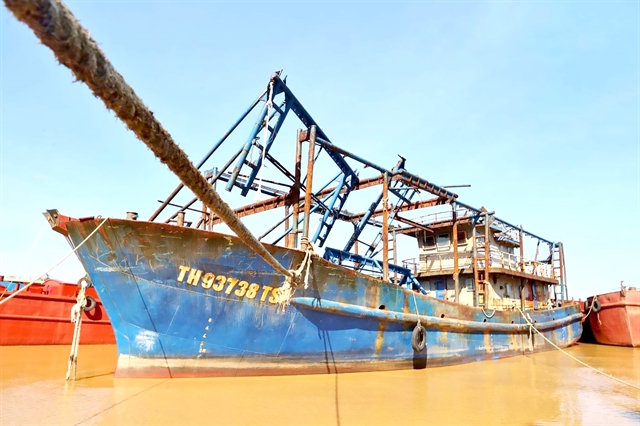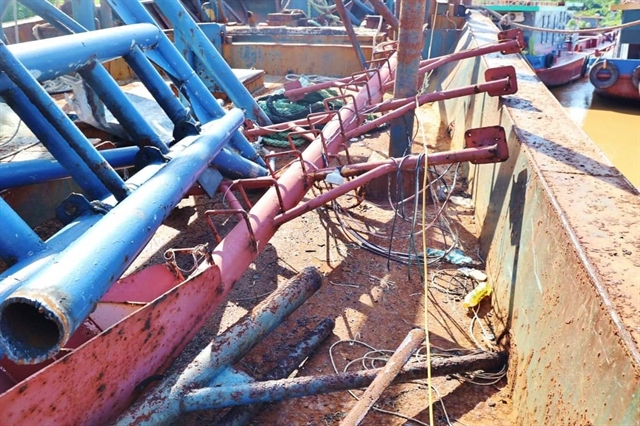 Society
Society

 |
| A steel-hulled fishing boat lies onshore as its owner, Phạm Văn Sơn in Hậu Lộc District, Thanh Hóa Province, is unable to pay off the debt. — Photos baotintuc.vn |
CENTRAL REGION — Along the central coastal area, tens of thousands of steel-hulled fishing boats have been laid up on shore for a long time while big boat owners struggle to pay off debts.
Under the Government's Decree No 67 issued in 2014, fisherman Phạm Văn Sơn in Hậu Lộc District, Thanh Hóa Province, borrowed a loan of VNĐ18.4 billion to build a steel fishing boat with high capacity.
In the first two to three years of operation, when the fishing source was abundant, the modern boat brought major profits to Sơn.
Thanks to Decree 67, fishermen like Sơn could access loans easily and went offshore with modern boats to catch fish. Many even were able to pay off the loans before the deadline. But the following years were not fruitful as they expected.
Due to a petrol price hike and increasing expenses on hiring staff, boat owners in the central region struggled to pay back the loans.
Sơn said when the expenses stayed low, he spent VNĐ250 million on petrol and more than VNĐ100 million on hiring staff. But as the prices climbed, he had to spend VNĐ500 million in total.
After two years of the COVID-19 pandemic, petrol price peaked at nearly VNĐ34,000 per litre, while the quantity of caught fish has declined, leading to a greater loss.
Sơn predicted a loss of VNĐ200 million so he decided to stop fishing.
Decree 67 allows ship owners to borrow a sum of money from commercial banks not exceeding 90 per cent of the total investment in the building of the ships. As a result, they can build steel or new-material ships with a total main engine capacity between 400CV and 800CV.
The interest rate is 7 per cent per year, of which ship owners are required to pay 2 per cent per year while the State budget would subsidise 5 per cent.
It is estimated that Sơn had to pay back the debt of VNĐ300 million per month, but due to the loss, he could pay only VNĐ60 million over the past six years.
During the six years, Sơn struggled to find ways to maximise profits. He headed to the southern sea, hoping to catch more fish, but still faced challenges.
The boat was broken and needed an engine replacement worth VNĐ700-800 million.
Knowing that should be the end, Sơn handed over the boat to the bank for debt recovery. The VNĐ18.4 billion boat is waiting to be sold for less than VNĐ2 billion liquidation.
Worse still, Sơn used his house's red book (land use rights certificate) as collateral for loans and could not take it back due to not being able to pay back the debt. As a result, his debt has now become a bad debt.
Sơn's story is typical of the central region's fishermen whose modern steel boats lie onshore with rusty engines after losses and debts.
 |
| Equipment on the steel boat worth tens of billions of đồng has now turned rusty. |
In the first six months of 2022, the petrol price kept hitting a high record with an increase of 60 per cent. This is the main reason for putting the steel fishing boats built under Decree 67 ashore.
According to the Ministry of Agriculture and Rural Development, about half of 90,000 fishing vessels across the country are ashore due to high fuel costs, unprecedented in the fishing industry's history. This has seriously affected the fishing community's income, life and social security.
Unprecedented policy
When Decree 67 was issued in 2014, it showed its efficiency with unprecedented regulations aiming to build modern fishing vessels and forming high-quality offshore fishing teams to support fishermen in improving livelihoods and protecting the nation's seas and islands.
After seven years of implementation, the number of fishing boats going offshore increased by 20.1 per cent compared to 2014. The policy also helped reduce fishing boat accidents, said Trần Đình Luân, head of the Fishery Department under the Ministry of Agriculture and Rural Development (MARD).
The number of offshore fishing boats expanded from 21,000 in 2014 to over 31,000 in 2021 with large capacity, modern equipment and technology.
However, the policy showed weaknesses.
Lê Văn Sáng, deputy head of the Fishery Division of Thanh Hóa Province, said the province has 58 boats built under Decree 67. The banks are now suing the owners of 20 boats for not paying back the debts. Thirty-eight other boats are being operated, but their owners struggle to pay the debts.
Vũ Đình Chinh, head of the economic division of Sầm Sơn City, Thanh Hóa Province, said fishermen are not familiar with responding to operating and rescuing when the boat has incidents. Therefore, it can be said that the ships have not been operated efficiently so far.
To address the problems, the Ministry of Agriculture and Rural Development is compiling a draft decree amending and supplementing policies on fisheries development. It will submit it to the Government this year.
The State Bank of Vietnam has proposed the Government approve the transfer of fishing vessels to remove bad loans.
The finance ministry proposed offering preferential social security policies to the boats.
Associate Professor Đinh Trọng Thịnh, a finance-economy expert, said this is a humane policy for fishermen to ensure their assets when they go offshore. Although there have already been preferential policies for boat and crew insurance, State management agencies, especially the Ministry of Finance, need to study and have greater support for the insurance policy. — VNS




